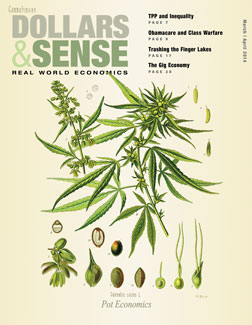A Little Better Now—But What about the Future?
The Jobs Report from the National Jobs for All Network

(You may have noticed some problems with the blog--several of the posts from earlier this year have strangely disappeared. I managed to repost Polly Cleveland's most recent post, about water rights in California, but then noticed that several others had disappeared. I think it is WordPress database corruption, but I am not sure. I hope to clear it up soon.)
Our March/April issue is (finally) out! I have sent the full-color pdf to e-subscribers, and our printers have all the files to start printing. See above--the cover (I forgot to email myself a larger version of it). We have also posted Dan Schneider's excellent cover article, Pot Economics.
Here is the p. 2 editorial note for this issue, which ended up having a theme of the class politics of government intervention:
The U.S. right likes to vilify government—for all the wrong reasons.
Minimum wage laws? Environmental regulations? The right says they’re “job killers.” Dean Baker refutes that old canard about the wage floor in his Comment, “Don’t Believe the ‘Job Killer’ Hype,” while explaining why a minimum wage hike would be a net winner for low-wage workers. Arthur MacEwan makes a similar case on environmental regulation—while posing a more fundamental question: “Do we really want to create jobs by engaging people to do socially destructive things?”
The ACA, or “ObamaCare”? The Wall Street Journal editors go ballistic about the new law’s projected negative effects on labor supply. John Millershows the editors’ argument for what it is: a damaging admission that the need for health coverage keeps workers in thrall to employers, and that even a flawed health-care reform can help free workers to quit bad jobs. Miller goes on to argue that a truly universal program could do much more.
Expansion of the money supply during a recession? The right has been screaming about looming “hyperinflation” for years. Steve Pressman’s In Review argues that attempts to draw parallels between the present and historical episodes of hyperinflation are badly misleading. Let’s focus instead, he argues, on the disaster of mass unemployment, where government intervention is crucial.
As readers of Dollars & Sense know, our writers frequently propose public solutions to social problems. You will find, however, no idealization of government here.
Can government policies help combat problems like inequality, barriers to economic development, or environmental degradation? It depends on the policies—and the policies themselves depend on forces acting on the government. More often than not, the high and mighty dominate government policy. What business and its ideologists call “free market” policies are not simply reductions in the size of government. They eliminate some forms of government intervention and substitute others. Where are the capitalists railing against “intellectual property” rights as a terrifying extension of government power? Tell us if you find one.
Much of this issue looks, in one way or another, at the complexities of government policy.
Dan Schneider’s “Pot Economics” notes that we are, at long last, seeing the rollback of disastrous pot-prohibition laws, which have exacted a high toll in lives ruined and treasure sunk. What will take their place, however, remains to be seen—and depends on the shape of new kinds of marijuana regulation.
Patricia Rodriguez’s “Lake Country, Not Trash Country!” looks at the struggles over largescale trash dumping in upstate New York. Here, local environmental activists have had to navigate a maze of government entities, not all of them sympathetic, trying to stay a step ahead of corporations adept at manipulating government officials to serve their interests.
Roger Bybee, in his Making Sense “TPP: Trumping Public Priorities,” gives us the clearest case of corporate dominance. Big corporations are crafting the Trans-Pacific Partnership (TPP) to roll back “public-interest protections on labor, food safety, drug prices, financial regulation, domestic procurement laws, and a host of other matters.” The story, however, doesn’t end there. Widespread public resistance may block the agreement, despite the corporate power play.
Matías Vernengo looks at the uncertain economic situation in Argentina, headlined by the drop in the value of the country’s currency. The gloating from the international business press is unmistakable: Argentina’s demand stimulation and income redistribution must not serve as an example to others! In reality, Vernengo argues, Argentina is not in a severe crisis—but it is still unclear what path the government will take. A rapprochement with global creditors, or a deeper move toward domestic economic development?
Not that this is new. This issue’s 40th anniversary excerpt takes a look back at what D&S had to say about the New York City bankruptcy in 1975. Back then, it was obvious not only to D&S, but also to Mayor Abe Beame, Governor Hugh Carey, and even the Daily News, that government could choose to intervene on behalf of ordinary people, or instead the federal government could side with the creditors and tell the city and its people) to “drop dead.”
Subscribe now and we'll send you this as a bonus issue.
--Chris Sturr